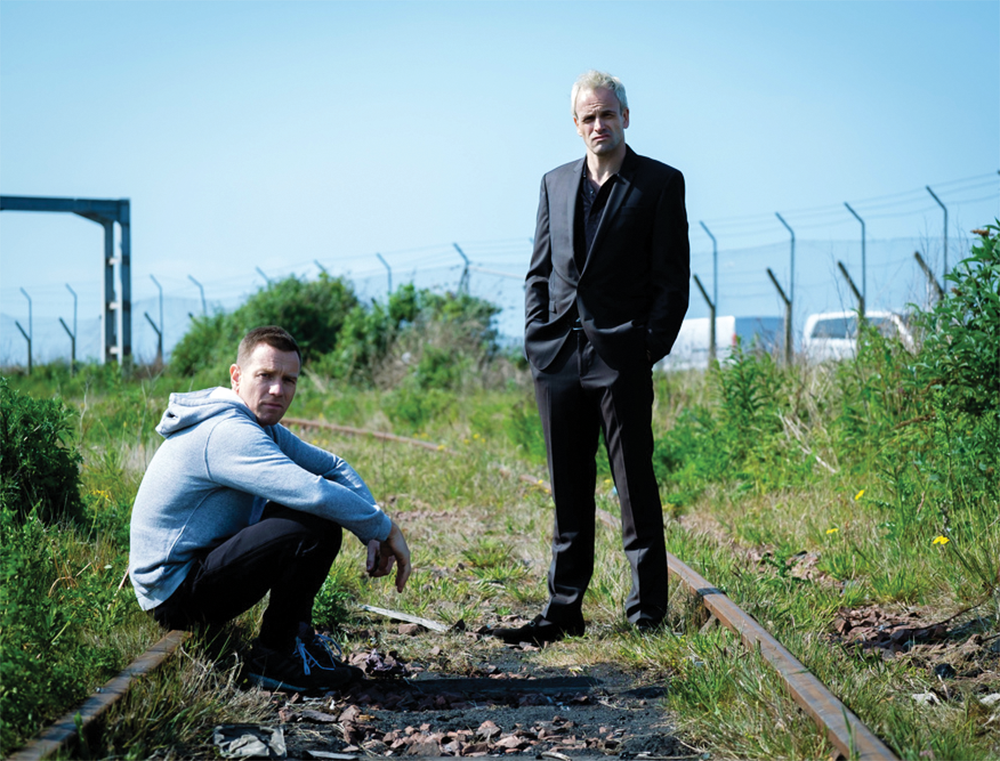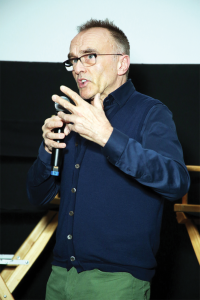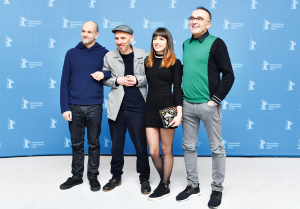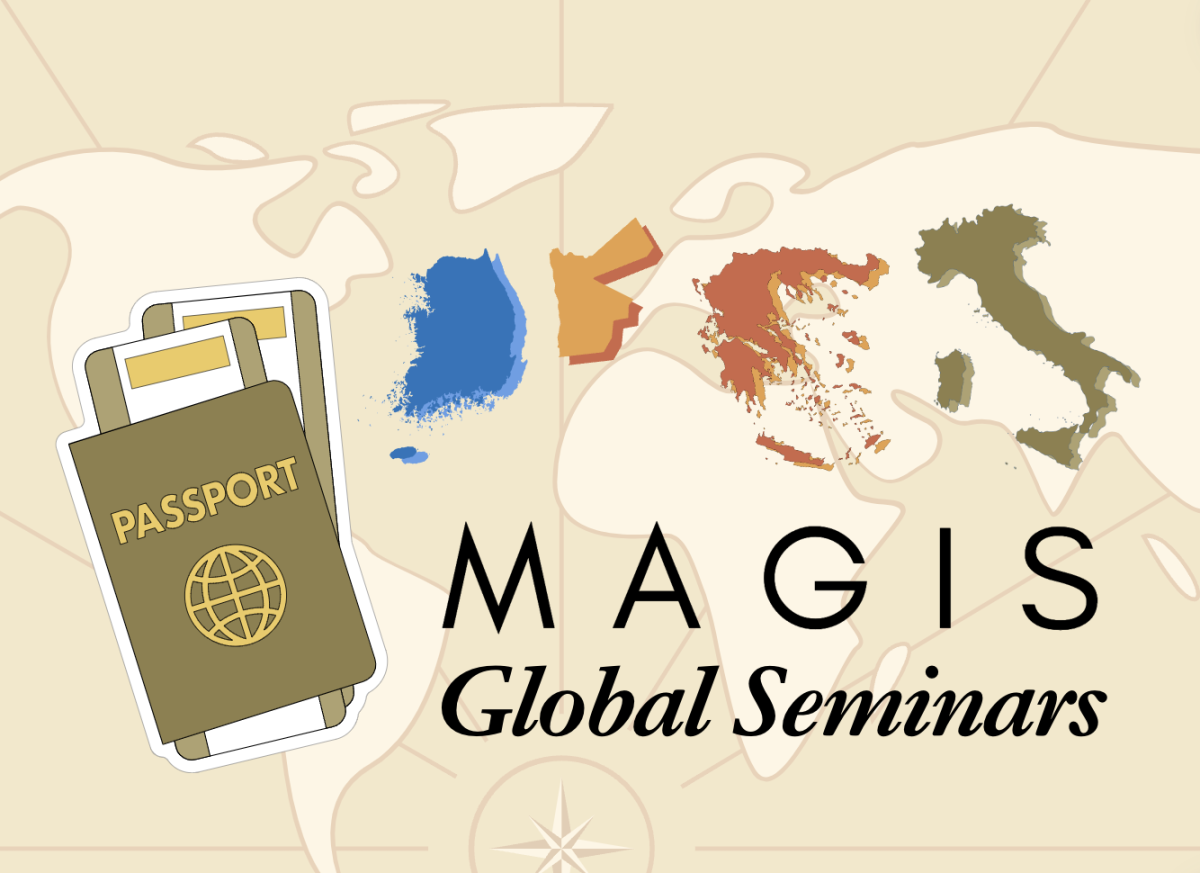
“First there was an opportunity, then there was a betrayal.”
Twenty years have gone by since Mark Renton (Ewan McGregor) left Edinburgh. Much has changed, but just as much remains the same. Spud (Ewen Bremner), Sick Boy (Jonny Lee Miller) and Begbie (Robert Carlyle) are awaiting him in the only place he ever felt at home.
“T2 Trainspotting,” which premiered March 17, reunites Academy Award-winning director Danny Boyle with McGregor, Miller, Carlyle and Bremner, the original cast of the 1996 classic “Trainspotting.” John Hodge returns as screenwriter, working from Irvine Welsh’s novel “Trainspotting” and its sequel “Porno.”
The Hoya sat down with Boyle, also known for “Slumdog Millionaire,” “127 Hours” and “Steve Jobs,” in an exclusive interview to discuss his long-awaited film and how he revived the cult classic to satisfy fans of the original film around the world.
This interview has been edited for length and clarity, and it contains spoilers for “Trainspotting” and minor spoilers for “T2 Trainspotting.”
Why did you make “T2 Trainspotting” 20 years after the first film came out?
When the first one came out, I think people were so flabbergasted that it was successful, but nobody imagined we would make a sequel because conventionally, sequels, you make them quite soon after the first film. And then Irving Welsh, who wrote the original book, “Trainspotting,” he published his own novel sequel called “Porno,” which was based around the idea of making a porno movie.
Initially, it is very daunting and there is a part of you that thinks you shouldn’t touch it. And we did touch it, 10 years ago when we tried the other adaptation. It was a good sign that we abandoned that because it was an inadequate — an inferior idea, even — whereas this felt right. When John [Hodge] and I went back to it a couple of years ago, it felt more personal, we were more honest about ourselves and our own aging, and we were already prepared to actually allow it into the film more, and of course that’s what the actors responded to as well. It felt like, although you were returning to sacred ground, there was a reason that you could justify doing it.

If you were going to take [the characters] up again, because they held such a high place for people, because there was genuinely an affection. People were talking about characters by their names. Nobody remembers characters’ names in movies. You remember the actor who played it, but not the actual character name.
But people talked about them, like Renton and Spud and Sick Boy. And so when the 20-year anniversary came up on the horizon, we thought, ‘Should we make it?’ So we met in Edinburgh for a week, me and the two writers, Irving Welsh and John Hodge, and two producers, and so what came out was something a bit more personal, really. And it felt like, you know, 20 years you can’t hide, and I loved that idea.
The film is about time, but it turned out to be much more about how badly men age, really. We hang on to the past. It’s why we are so obsessed with sports — we talk mad about sports — and it is because sports are usually about guys in their twenties being highly competitive. And we love that! For the rest of our lives, we dream of scoring that final goal, holding the cup. It’s just occupying the past in a way that is not even acknowledging living in the past, it’s like imagining you can still live like that forever.
How do you make something that is new if you base it on nostalgia? Because this is not a look back with loving eyes to any of these characters.
You know, nostalgia — although it has a bad name — it’s a part of all of us, really. The past is always a part of you. Those who eradicate the past are to be truly feared. In my reckoning, you have to make some peace with it — Renton does, anyway. He has to return and make some kind of tolerance for what he’s done, and for the losses, you know — his mother, Tommy, the baby — those casualties from the first film.
Spud becomes the narrator of the story as he begins to write anecdotes, sharing them with Begbie and Veronika. Why is Spud ultimately the voice of the film?
One of the few consolations of aging, I think, and [Marcel] Proust thought — not that I’ve read any Proust, but I’ve read some stuff about Proust — is that time loops, it doesn’t just walk in a straight line. Genuinely, the writers and I decided — while not a very popular choice amongst the producers in the studio, because they said, ‘What? Are you going to spend the end of the movie with two grown men reading stories to each other?’ and we said, ‘Yes, that’s exactly what we’re going to do’ — to bring the loop back to the original novel toward the end.
It felt as something that arrived quite late and it gave Spud, the most hopeless of all the characters in a way, something to rise out of his addiction to heroin. He begins to replace it with the fact that he’s found his voice, and everybody’s always told him that he’s worthless, and useless, and an idiot and stupid. He ultimately finds worth in his voice, that’s the key element in Irving’s book and why “Trainspotting” is such an important novel. It gives voice to people that are marginalized and are regarded as stupid or evil or victims if you pity them, and it gave them an ascendant voice. Spud is writing the first book, that was the idea.
What is the significance of reinterpreting the “choose life” monologue in an era of social media and the internet?
The “choose life” speech is a litany of addictions. What Renton was mocking on the first film were bourgeois addictions, really — you know, the sofa, the washing machine. And obviously, in 1996, there was no Internet, so that was obviously a huge game changer in terms of modern life and the way that people live their lives, and so it felt good that a critic like Renton should commentate as an outsider. It felt right that he should update his monologue.
But of course, he’s doing it live. It’s not a voice over anymore, so he stumbles during it. It becomes more confessional, more personal because it’s not a sardonic, cold-eye-on-the-world look. He is actually quite full of anger and his choices have not worked out, and he’s been left behind. So, when he’s mocking all that stuff — Facebook, Twitter, Instagramming your breakfast — it’s partly because he’s been left behind.
So it’s a very valuable speech. It starts off looking trendy and valuable, but it actually becomes personal and valuable by the end because he says, ‘Choose disappointment … choose not becoming the person that you wanted to be.’ So he is beginning a process by which he is getting his voice back again.
Can I ask you about the music? For the first film, did you think you were going to get the rights to everything?
We put all this music on and everyone said, ‘You’ll never get that, it costs so much money,’ and we were very fortunate that David Bowie had seen the first film we made, “Shallow Grave,” and really liked it. And because of course, he worked with Lou Reed and Iggy Pop, he knotted through the permissions to use those and we got them, and that was amazing. And, of course, one of the weird things about doing this film was that, since then, Lou Reed has passed away, David Bowie has passed away, and so we tried to include a tiny tribute to both of them.

Did you know you were going to use some of the original songs, especially Iggy Pop’s “Lust for Life”?
Obviously, we had that in our minds. We were only going to use the original music if we could remix it, rethink it or reimagine it, and we were actually very lucky to get a Prodigy remix of “Lust for Life.” The weird thing about a sequel is it has to be the same but different. So the music, you could hear it again, but it wasn’t just a rehashing of the first one. Underworld reimagined “Born Slippy” for us, so you could hear those chords that people recognize, but in a different context — in a much more melancholic context.
Are there any exciting new additions to such an iconic soundtrack?
I found this band called Young Fathers who are from Edinburgh, and ironically they are from the same estate that Irving Welsh grew up on. And their stuff is quite hip-hop, there are three or four songs on the film, and we could have used half a dozen more of them. They just slotted into the film and worked perfectly. They sent us this track, “Only God Knows,” which is a brand-new track they wrote for the film, and they are a wonderful band to get to know. They are really special, one of the best bands in Britain at the moment, for sure.
You talked about improvisation as a director, not in terms of the script but in terms of filming. I’m interested to know, what were some “happy accidents” in this film?
It doesn’t make sense to the financiers or to the studio because you leave a camera for days, so for instance, in the scene that everybody loves — the normal Catholics’ singalong — you leave a camera on Jonny Lee Miller on the piano. Now, Jonny can’t really play the piano. I mean, he learned some very basic stuff and that suits the character because he is remembering chords from school days, really. But you leave the camera on him for a day, a day-and-a-half, and that makes no sense to the financiers, but what you get out of it is a moment. I don’t know whether you remember in the film, when he first sits down and he plays a chord and then he goes, ‘No.’ It’s just pure genius. If you set it up, you probably wouldn’t get that moment. It’s probably because Jonny’s forgotten. He’s probably thinking, ‘Oh no, it’s not this one, it’s that one.’
You get things like that, which you can’t justify to a financier because the cost of leaving that camera rolling for so long for multiple takes — Jonny’s even forgotten it’s there — may not be logical to them. But what you get is these gems out of the actors and coincidences. It’s a lot of rubbish and wastage — there are many times that you don’t get anything at all — but you do get those pure gems and they’re priceless really, they’re worth a hundred million dollars, you know? Also, I had very quick actors because they value time for little experiments like that, so it’s stuff like that really, which seems so inconsequential, but there is a delight when that moment happens.
Is the film meant to reflect not just the “lads” growing up, but you as well?
Yeah, I mean the other film is very exciting and crazy and bold, but this is more thoughtful — it just inevitably is — it’s much more considered. The first one was chaotic and internal, there’s no sense of place. The first one is about being on your early mid-twenties, and as a man, you don’t care about anything really. We’re often accused of it, and quite rightly — it’s reckless, carefree. And, of course, the point about updating it, we’re saying they’re coming back again after 20 years, which is a huge milestone in people’s lives, is that they will be different. They are the same, but they will be different. And the film will be different as well. But you also have these chaotic scenes where they are trying to enjoy themselves. It’s a slight struggle because it’s not as effortless as when you were in your early twenties.
What was it like getting all the cast and crew together again and how quickly did you guys find that old rhythm from the original film?
They found it very quickly, the actors. They were right at it, straight away, which really surprised me because I was expecting a kind of hesitancy, and they did feel that right at the early days that we thought, ‘Should we do this?’ But once the actual acting started, the rhythm was perfect. As for me, the main thing I copied from the first film was — in terms of directing — to leave as many decisions as late as possible because I remember doing that in the first film. When you’re doing something very stylized, it can go two ways: it can look like you’ve inserted the actors into it and its highly glossy style —and they move around in it and try to make their mark in it — or you can let it connote the craziness of the characters. And they are crazy characters, they are quite extreme — all four of them — in a way. I mean, Renton less so, but the other three are pretty extreme characters in a way, so I tried to get as much of it to come from them as possible. So, [I was] finding my rhythm back through them, but they found it very quickly.
How much do you feel that Edinburgh itself plays a character in this film?
Edinburgh has changed. It’s a much younger city now, ironically, than it was. The clubs are packed, students are everywhere. And it wasn’t like that when we made the first film. It was quite a kind of pristine, kind of slightly reserved city, rather middle-class, bourgeoisie town. Now, it’s young, its population are mostly students. Those students are from abroad and from home and they’ve changed the town.
The other thing that’s changed the town is the migrant labor, migrant workers — a lot of them from Eastern Europe — have come into the town and they’ve changed the nature of the town, and that obviously reflects on the character of Veronika as an ingredient in the city that’s changed it.




















shimul • Jul 25, 2021 at 10:12 pm
Your Blog is very very interested. But my product a Essential really have many business planning! check my site for a